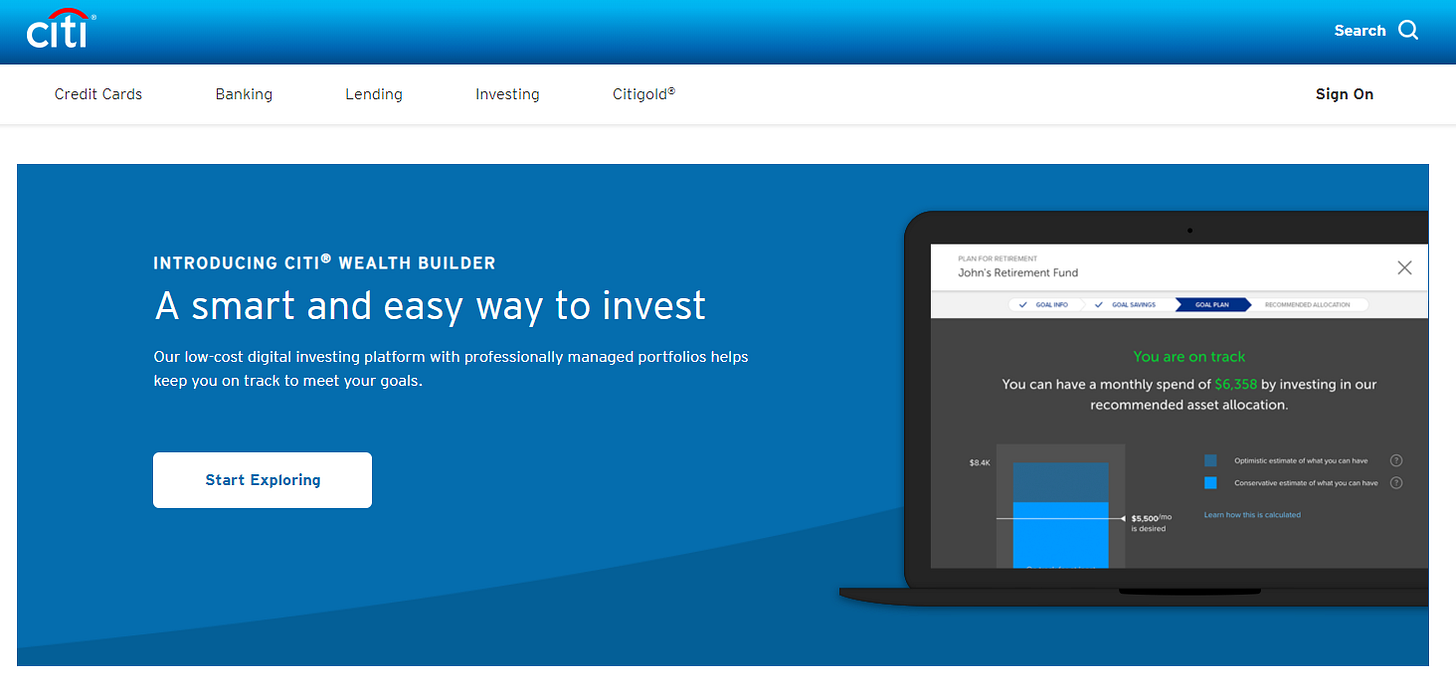Citi launches free roboadvisor, and how roboadvisors are like Twinkies. +20 key Fintech developments
Hi Fintech futurists --
In the long take this week, I discuss Citi's roboadvisor launch and why it took the firm 12 years to get to the party. We break down the difference between financial services ingredients and the organizations that combine those ingredients to manufacture and distribute financial products. We also look at how that consumer prerogative is defining the asset management industry, and the consolidation towards monolithic passive indexing providers. Last, we talk about how people prefer mass produced Twinkies to expensive artisanal desserts. Yummy!
The latest key updates on Fintech bundles, Crypto and Blockchain, Artificial Intelligence, and Augmented and Virtual Reality are below. Thanks for reading and let me know your thoughts by email or in the comments! Last but not least, these opinions are personal (or maybe made by a robot) and do not reflect any views of ConsenSys or other parties.
Long Take
I got a fantastic question from my friend Geoff Yamane the other day, which I will unabashedly steal to promote his website:
If the function of financial services is (a) duration-transformation; (b) risk transformation; (c) capital funding, what's actually happening if Fintech solutions are all B2B / B2C front-ends? They've abstracted away customer service, origination, and other operating functions from financial services, but behind the scenes a bank or financial investor still must manage risk, capital, and duration.
... But maybe all these fintech services are merely customer-facing API layers for the core functionality that a banking system must provide? Of course, it is a fair question if a bank is still a bank once you've abstracted away branches, customer services, servicing fees, which are the bread and butter.
But doesn't that seem about where the discount brokers have gotten to? Schwab's only remaining fee line is basically NIM (duration-transformation, risk-transformation) and human advisory, every other fee stream is shrinking.
These are great points, because I sometimes forget -- and am often corrected by smart people -- that operations of a business is not the same thing as the thing that business makes. The car company has (1) a human organization and (2) a factory that makes cars. You still need raw materials to make the car, whether the factory is staffed and overseen by humans or machines. The music business has (1) a human organization and (2) the raw materials of music-making. A musician has to actually make something out of emotional mana, before an algorithm can crunch it and insert it into Spotify. Let's put it in the most clear way possible for Finance.
Capital, duration, and risk are the ingredients from which the dish is made.

Asset allocation, structuring, and underwriting are the cuisines according to which we prepare the ingredients.

Some people want to cook at home. Others want to go to an expensive restaurant to feel fancy. Most people buy Twinkies from Walmart.

And here's the important bit. Most people most of the time are going to get the mass-produced, cheap, easy-to-access option. They consume a lot more Twinkies (Little Debbies pictured due to author preference) than hand-crafted, bespoke desserts. Yes, there are cases where we have special occasions and go to expensive restaurants. Yes, there are wealthy people that only eat out and have beautiful hand-crafted experiences. But most Fintechs are not trying to make "food" (i.e., products) only for that high-net-worth audience. They are trying to take the hand-crafted beautiful stuff, and give it to everyone in a shlocky, processed, viral package.
I say this in the context of two data points. The first is the launch of a free roboadvisor by Citi to customers that have over $50,000 in assets with the firm. Let's not talk about price compression and other things already covered when Merrill, JP Morgan, Schwab, Vanguard, TD Ameritrade, Fidelity and many others announced similar initiatives. Instead, let's talk about the path to get Citi to sell Twinkies in 2020.
In 2008, a company called Jemstep was founded. They raised $15 million, which was a lot at the time, but a pittance in the SoftBank era. My start-up NestEgg Wealth (and later AdvisorEngine) used to have a friendly competition with Jemstep. In 2016, Jemstep was acquired by the asset manager Invesco. The premise for many of the acquisitions at the time, like BlackRock/FutureAdvisor, was that the asset manager could get much closer to financial advisors and distribution by giving away their core technology.


In 2020, Citi finally launched a software ideated, developed, and commercialized by this team -- a team that had the idea 12 years ago. Being the fourth largest US bank, it takes time to get to market. Can we can call this deployment to potentially hundreds of millions of customers a success? I truly don't know. What I do know, however, is that something that used to be hand-crafted at Citi (and the rest), is now pre-packaged and mass-produced and given away for free. Jemstep did not capture the upside value, the way a Robinhood or SoFi may be attending to do. But, potentially, it had a much larger impact per venture dollar invested.
Second, I want to point you to this fantastic overview by Bloomberg: Asset Managers With $74 Trillion on Brink of Historic Shakeout. The one tricky thing about assets under management is that they are constantly being double-counted. Wealth managers (i.e., the distributors) count them for their wealth management fee. Advisors generally don't care if they are selling mutual funds or ETFs; but they do care if Amazon or a mobile app replaces them. Asset managers (i.e., the manufacturers) count assets for their expense ratios. They don't care if the assets are being sold by people or robots, but they do care if those assets are actively or passively managed. Both of these fees are applied to the same assets. And spoiler alert -- assets are largely going to be passively managed.



Index funds are easy to understand, have a viral narrative, and are pre-packaged like Twinkies. Your artisanal small-cap value Brazil fund may take a lot of expensive Wharton grads to make, but that simply doesn't matter. What matters is how a consumer orders takeout with Deliveroo on their phone, how Amazon built its next-day free delivery with one-click shopping, and how Netflix makes shows based on what the data tells them you want to watch. Is your financial services business really so special that the forces shaping consumer expectations across billions of devices don't apply to you?

Further, ETFs have the advantage of sitting on better market architecture -- from the perspective of the consumer. You have real-time pricing on the underlying assets with buy/sell liquidity at any point in the day. There are no hacky batched redemptions or unnecessarily expensive entrance or exit fees. By being more technologically advanced, ETFs can sit in the same trading and asset allocation systems as stocks. They are easier to plug into a mobile-first world, and they are, in fact, the only thing that really makes sense to put into roboadvisors (from a cost perspective). So when Citi switches its retail offering to an automated program, the only choice for that program is to provide ETFs. This is the power of infrastructure rails and consumer selection.
I leave you with a screenshot from McKinsey's 2030 investment management predictions. By design, McKinsey is a mirror of the current state, not a portal into the future. They reflect what entrepreneurs have already built (e.g., Citi being 12 years late). But the graphic tells you everything you need to know about where we already are.

Key Fintech Developments

Citigroup unveils free robo-advisor for customers with at least $50,000 at the bank
Europe’s main banking regulator, an arm of the ECB, is trying to make it easier for the continent’s financial lenders to merge in a move that will help jump-start a lagging economy and 5 policy hurdles thwarting US federal regulators’ fintech ambitions


IBM CEO Ginni Rometty is stepping down, SVP and Director at IBM Research Arvind Krishna to take over
5 Dead-Simple Ways Chat-bots Unlock The Path to Greater E-Commerce Sales

Leading Technology Trends in Virtual Reality, Revealed by GlobalData
India’s plans for data centre parks may finally force Facebook and Twitter to localise
Facebook CEO: “On Christmas Day, People Bought Almost $5M Worth Of Content In The Oculus Store”
Looking for more?

Get this writing directly in your Inbox by subscribing here.
Find me on Twitter here for Fintech and here for Digital Art.
Check out ConsenSys Codefi for software powering digital assets, financial enterprise blockchains, decentralized finance, and crypto payments.
Want to send me a note? Reach out here anytime.


